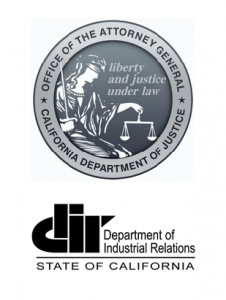 California Attorney General Xavier Becerra and Labor Commissioner Julie Su this week issued two documents for California employers dealing with California’s Immigrant Worker Protection Act (AB 450).
California Attorney General Xavier Becerra and Labor Commissioner Julie Su this week issued two documents for California employers dealing with California’s Immigrant Worker Protection Act (AB 450).
• Attorney General Becerra issued an advisory providing an overview of and guidance on the privacy prescriptions under AB 450.
• Commissioner Su also issued joint guidance on frequently asked questions to help employers and workers understand and comply with the new state law.
Links to both documents are available in the media section on the Attorney General’s website at www.oag.ca.gov.
Under AB 450, all employers, regardless of size, must limit U.S. Immigration and Customs Enforcement (ICE) agents’ access to both the worksite and employee records, and must follow new notice obligations. This law applies to all California employers and went into effect on January 1, 2018.
Warrants/Subpoenas Required
California employers can no longer consent voluntarily to allow ICE to enter nonpublic work areas or to access company records. Instead, ICE must present legal documentation before employers can allow access.
Employers cannot voluntarily allow an ICE agent to enter any nonpublic areas of a business without a judicial warrant. The employer can take the agent to a nonpublic area to verify the warrant, as long as no employees are present and the employer doesn’t provide consent to search nonpublic areas in the process.
Employers cannot voluntarily allow agents to access, review or obtain employee records without a subpoena or judicial warrant.
The prohibition does not apply to Form I-9 or other documents for which a Notice of Inspection (NOI) was provided to the employer.
Notify Employees
Employers must follow specific requirements related to Form I-9 inspections. For example, within 72 hours of receiving a Notice of Inspection, California employers must post a notice to all current employees informing them of any federal immigration agency’s inspections of Forms I-9 or other employment records.
CalChamber added the new Notice to Employee English and Spanish versions to the HRCalifornia website. These forms are available for free.
Employers also have obligations once the inspection is over. Within 72 hours of receiving the inspection results, employers must provide each “affected employee” a copy of the results and a written notice of the employer’s and employee’s obligations arising from the inspection. The written notice must contain specific information and must be hand-delivered in the workplace, if possible. An “affected employee” is one identified by the inspection results as potentially lacking work authorization or having document deficiencies.
Unions also have the right to receive notices.
An employer that fails to follow any of these notice requirements can be fined between $2,000 to $5,000 for a first violation and $5,000 to $10,000 for each subsequent violation.
At the same time, federal penalties for Form I-9 violations can range from a couple hundred dollars to more than $20,000.
Preparation Is Essential
Because the timeframes are so short, preparation is key to meeting the notice requirements. Employers should have a process in place to respond to Notices of Inspection. Employers should identify who in their organization would likely receive a Notice of Inspection and confirm that person knows how to respond.
CalChamber members can learn more about Worksite Immigration Enforcement and Protections in the HR Library.
The white paper, Worksite Immigration Enforcement: What You Need to Know is available for nonmembers to download. CalChamber members can also access this white paper on HRCalifornia.

